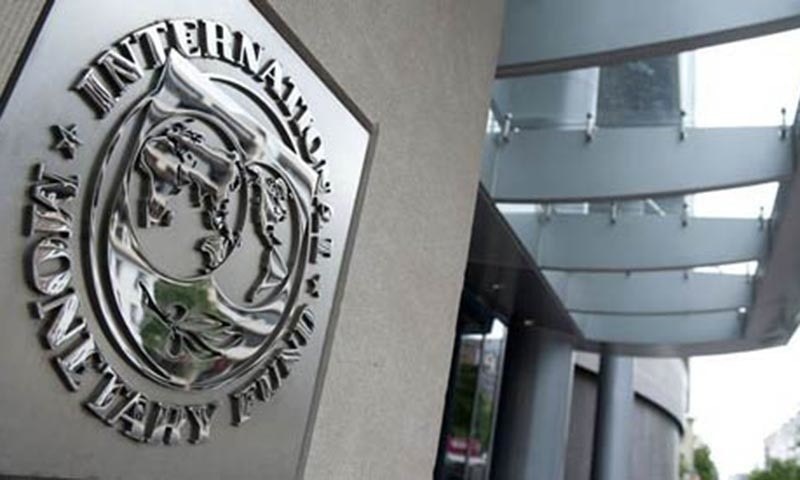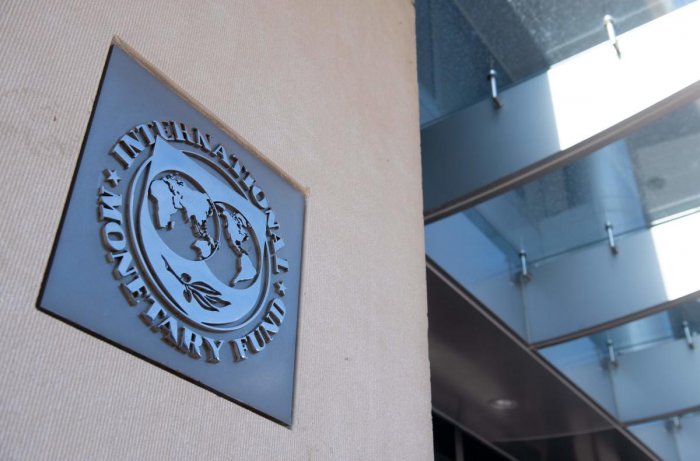ghazi52
PDF THINK TANK: ANALYST

- Joined
- Mar 21, 2007
- Messages
- 101,794
- Reaction score
- 106
- Country
- Location
IMF approves $2.8 billion in fresh funds for Pakistan
Inflows will help country to combat challenges arising from Covid-19
Salman Siddiqui
August 04, 2021

KARACHI: The International Monetary Fund (IMF) has approved allocation of new funds for its member countries, including Pakistan, to help them combat the challenges arising from the Covid-19 pandemic and put the global economy on a sustainable growth path.
Under the new allocations, Pakistan is estimated to receive $2.8 billion during the current month (August 23). The inflows are projected to lift the country’s foreign currency reserves to a new record high of over $20 billion.
Besides, the inflows will not only improve the country’s capacity to make payments for imports and repay foreign debt, but will also help arrest the rupee depreciation against the US dollar and other major currencies.
The State Bank said last week (July 27) “in August, Pakistan’s reserve buffers are expected to rise by another $2.8 billion through the IMF’s planned new global SDR (Special Drawing Rights) allocation.”
Earlier, the Washington-based lender disbursed $1.4 billion to Pakistan in April 2020 under its first global SDR allocation to member countries to cope with the contagious disease. The IMF board of governors approved a general allocation of SDRs equivalent to $650 billion (about SDR 456 billion) on August 2, 2021 to boost global liquidity, according to an IMF press statement.
“This is a historic decision - the largest SDR allocation in the history of the IMF and a shot in the arm for the global economy at a time of unprecedented crisis,” IMF Managing Director Kristalina Georgieva said in the statement available on its official website. “The SDR allocation will benefit all members, address the long-term global need for reserves, build confidence and foster the resilience and stability of global economy.”
It would particularly help the most vulnerable countries struggling to cope with the impact of the Covid-19 crisis, she said. The general allocation of SDRs will become effective on August 23,
2021. The newly created SDRs would be credited to IMF member countries in proportion to their existing quotas in the Fund, it added.
“Currently, Pakistan’s quota (percentage of the total) is around 0.43%,” Arif Habib Limited (AHL) analyst Sana Tawfik said in a post-IMF SDR allocation commentary.
“SBP’s foreign exchange reserves currently stand at $17.82 billion and the (new) inflows can potentially take them past $20 billion - the highest in Pakistan’s history,” Topline Research Director Syed Atif Zafar said in comments on the IMF allocation.
To date, the highest level of SBP reserves was recorded at $19.46 billion in October 2016.
The foreign currency reserves have been on the rise for the past two years due to robust inflows of worker remittances, improvement in export earnings and growth in investment by the non-resident Pakistanis through the Roshan Digital Account (RDA).
The country’s reserves are partly maintained through deposits by friendly countries like Saudi Arabia, Qatar and China and through central bank’s short-term borrowing from commercial banks.
Almost half of the current foreign currency reserves of $17.82 billion “have been built through long-term borrowing from the international financial institutions, friendly countries and short-term borrowing,” Economist Shahid Hasan Siddiqui said the other day. The reserves have dropped slightly by around $200 million to the current level from the four-and-a-half-year high of $18.05 billion recorded in the week ended July 16, 2021.
The central bank said last week that imports might continue to remain high during the current fiscal year, meaning that the uptrend in demand for US dollar may persist and it will impact the rupee-dollar parity and foreign exchange reserves.
Accordingly, the State Bank of Pakistan (SBP) projected the current account deficit to increase to 2-3% of GDP in the current fiscal year compared to a 10-year low of 0.6% recorded in the previous fiscal year.
It, however, said the deficit at 2-3% was sustainable. It would allow the economy to grow by 4-5% in FY22 compared to 4% in FY21.
The increased demand for dollar for imports and foreign debt repayment took a toll on the rupee as the value of local currency dropped to a 10-month low of Rs163.89 against the US dollar in the inter-bank market on Tuesday.
The IMF said about $275 billion (SDR 193 billion) of the new allocation totaling $650 billion would go to emerging markets and developing countries, including the low-income countries.
“We will also continue to engage actively with our membership to identify viable options for voluntary channeling of SDRs from wealthier to poorer and more vulnerable member countries to support their pandemic recovery and achieve sustainable growth,” Georgieva said.
Published in The Express Tribune, August 4th, 2021.
Inflows will help country to combat challenges arising from Covid-19
Salman Siddiqui
August 04, 2021

KARACHI: The International Monetary Fund (IMF) has approved allocation of new funds for its member countries, including Pakistan, to help them combat the challenges arising from the Covid-19 pandemic and put the global economy on a sustainable growth path.
Under the new allocations, Pakistan is estimated to receive $2.8 billion during the current month (August 23). The inflows are projected to lift the country’s foreign currency reserves to a new record high of over $20 billion.
Besides, the inflows will not only improve the country’s capacity to make payments for imports and repay foreign debt, but will also help arrest the rupee depreciation against the US dollar and other major currencies.
The State Bank said last week (July 27) “in August, Pakistan’s reserve buffers are expected to rise by another $2.8 billion through the IMF’s planned new global SDR (Special Drawing Rights) allocation.”
Earlier, the Washington-based lender disbursed $1.4 billion to Pakistan in April 2020 under its first global SDR allocation to member countries to cope with the contagious disease. The IMF board of governors approved a general allocation of SDRs equivalent to $650 billion (about SDR 456 billion) on August 2, 2021 to boost global liquidity, according to an IMF press statement.
“This is a historic decision - the largest SDR allocation in the history of the IMF and a shot in the arm for the global economy at a time of unprecedented crisis,” IMF Managing Director Kristalina Georgieva said in the statement available on its official website. “The SDR allocation will benefit all members, address the long-term global need for reserves, build confidence and foster the resilience and stability of global economy.”
It would particularly help the most vulnerable countries struggling to cope with the impact of the Covid-19 crisis, she said. The general allocation of SDRs will become effective on August 23,
2021. The newly created SDRs would be credited to IMF member countries in proportion to their existing quotas in the Fund, it added.
“Currently, Pakistan’s quota (percentage of the total) is around 0.43%,” Arif Habib Limited (AHL) analyst Sana Tawfik said in a post-IMF SDR allocation commentary.
“SBP’s foreign exchange reserves currently stand at $17.82 billion and the (new) inflows can potentially take them past $20 billion - the highest in Pakistan’s history,” Topline Research Director Syed Atif Zafar said in comments on the IMF allocation.
To date, the highest level of SBP reserves was recorded at $19.46 billion in October 2016.
The foreign currency reserves have been on the rise for the past two years due to robust inflows of worker remittances, improvement in export earnings and growth in investment by the non-resident Pakistanis through the Roshan Digital Account (RDA).
The country’s reserves are partly maintained through deposits by friendly countries like Saudi Arabia, Qatar and China and through central bank’s short-term borrowing from commercial banks.
Almost half of the current foreign currency reserves of $17.82 billion “have been built through long-term borrowing from the international financial institutions, friendly countries and short-term borrowing,” Economist Shahid Hasan Siddiqui said the other day. The reserves have dropped slightly by around $200 million to the current level from the four-and-a-half-year high of $18.05 billion recorded in the week ended July 16, 2021.
The central bank said last week that imports might continue to remain high during the current fiscal year, meaning that the uptrend in demand for US dollar may persist and it will impact the rupee-dollar parity and foreign exchange reserves.
Accordingly, the State Bank of Pakistan (SBP) projected the current account deficit to increase to 2-3% of GDP in the current fiscal year compared to a 10-year low of 0.6% recorded in the previous fiscal year.
It, however, said the deficit at 2-3% was sustainable. It would allow the economy to grow by 4-5% in FY22 compared to 4% in FY21.
The increased demand for dollar for imports and foreign debt repayment took a toll on the rupee as the value of local currency dropped to a 10-month low of Rs163.89 against the US dollar in the inter-bank market on Tuesday.
The IMF said about $275 billion (SDR 193 billion) of the new allocation totaling $650 billion would go to emerging markets and developing countries, including the low-income countries.
“We will also continue to engage actively with our membership to identify viable options for voluntary channeling of SDRs from wealthier to poorer and more vulnerable member countries to support their pandemic recovery and achieve sustainable growth,” Georgieva said.
Published in The Express Tribune, August 4th, 2021.



